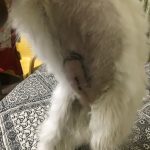Hello,
It sounds like you are getting a thorough work up and moving in the direction of some answers.
I have treated quite a few Addisonians and once diagnosed and started on treatment most do very well. If you have any questions or concerns ask for an internal medicine referral and go from there. Good luck. I hope she is feeling better soon.
My cat has a very irritated, red & inflamed throat and the vet examined him under anesthesia a while ago and he’s been taking prednisolone for almost 3 weeks and he’s slowly coming off of it now and will be done with it by next week. After all this time, we are still not seeing any results, he still coughs and gags all the time. I was just wondering if there is ANYTHING I can do at home to help him even a little bit. I know his throat is probably so sore and I just want to know if there’s anything I can try, such as a humidifier or switching to wet food.. anything!
thanks!:)
Comments
My 4 year old Lab has been sick since Thursday. She wouldn’t eat, threw up bile, has diarrhea and just wasn’t herself, I took her to her vet Friday afternoon unfortunately they were closing, they gave her some fluid and medicine to calm her stomach, and sent us home with some medicine and a canned food.. They said if she wasn’t improving in 24 hours to take her to the emergency room for a full work up Unfortunately, we had to take her in on Sunday, after some test and after 3 day they told us she is finally eating a small amount and her stool is thicker and not bloody anymore. Her protein is low they did a ultrasound of her stomach and said everything looked normal but her adrenal glands are small so they are now testing her for Addisons disease. I tried to do some research but cant figure much out, does anyone have any information or has had a pet with Addisons disease? Is it common for a 4 year old healthy dog to start showing symptoms?
I just want my baby home!!! thank you!
Comments
My vet thought my cat had a polyp. He went in this morning for them to look into his throat under anesthesia. Turns out he doesn’t have a polyp just has an inflamed throat. They said they can just give him some medicine and he’ll be good. He’s had these symptoms for years.. can an inflamed throat last that long? do you have any advice? will the medicine cure it or just treat it?
Comments
PLEASE HELP ASAP!!! I have a 10 year old black lab and today he was kicked in the side close to his back leg by a horse. I cannot get him in the car to go to the vet. Can I give him aspirin or anything for the pain??? He’s letting me pet him where he was kicked. Can a vet prescribe him any meds without him being seen?
Comments
Hello. My vet suspects my cat has one or more nasal polyps. I’ve been going through this process of getting towards his surgery for a while. The vet told us he has a heart murmur, but only a grade 1 out of 6, I brought him to a 2nd vet and they said his heart sounds great, I went back to the first vet and they looked at him again and the doctor said he has a murmur and even his vet tech looked over it and didn’t hear it the first time and the doctor had to tell her where to listen and she finally heard it. They said we would need some test on his heart before during surgery to make sure his heart doesn’t fail while under anesthesia. I got an x-ray done of his heart which came back fine and i also got blood test done which came back fine. The test he got were included in the basic wellness screen. I’m thinking he has a intermittent heart murmur because of his heart rate going up due to stress of being in the car and at the vet. The vet is still telling me i can have an echocardiogram done to be really sure his heart is really fine. That’s another $390 on top of the $500 i’ve already spent and i just can’t afford it. I believe if 2 vets could simply look over it, and it’s only a grade 1/6, and the test and x-rays came back fine so far, he should be good… right? Well another thing is they don’t know how many polyps he has or where exactly they’re located, we asked for a throat/head xray and they told us they can only do it if he’s under anesthesia first. They are adding on so much stuff i feel like he doesn’t even need and gave us a price estimate from $450-$1,500. We asked the other vet and they said they can do a head x-ray, but they don’t even know if the procedure of removing the polyps is even anything they can do, and he might have to go to a specialist. Can the polyps for sure be seen on the x-rays because i really don’t want to waste any more money on something that doesn’t even help get down to the problem. I’m thinking i can just skip over the echocardiogram because it doesn’t seem it’s really needed, i get an x-ray of his head, find the size, how many, and where the polyps are located, then get a real price estimate. Can someone please answer my questions or give any advice! Thanks:)
Comments
My neighbor’s outdoor cat that she claims as hers because it hangs out at her home and she feeds is wildly neglected. the poor cats left side canine teeth have fused together with plaque and she can’t open her mouth to eat properly or drink water as her tongue sticks out on the right side of her mouth. She seems dehydrated and flea infested-I gave her half dose of Bravecto since she feels like she’s 4-5 pounds and is about 6-8 years old. The neighbor doesn’t seem to see this and believes that cat is fine since she’s trying to eat…… She has an indoor cat that she takes care of really well. Any recommendations? if I take the cat to the vet for dental treatment, what would the cost be for something like this and would a cat in this condition even make it through anesthesia?
Comments
My 4 year Lab x Great Dane x bull mastiff had TTA surgery on his left knee about 15 months ago and about 9 days ago he had to have surgery on it again for a Latent meniscus tear on the back of the medial side.
A few days ago he developed a seroma. It’s a good handful size. When the vet aspirated some fluid it was the normal blood stained colour however the fluid was quite viscose (this vet was filling in for the vet that did the meniscus surgery as he is away for a few weeks). My concern is that synovial fluid is leaking into the dead space, along with normal fluid. If SF is leaking from the internal incision site of the joint capsule, will this heal on its own? Also has this occured because Benson may have been over doing it, even though I’ve tried very hard to limit his activity? No fluid is leaking out of the suture site on the skin. He’s currently on antibiotics and a NSAID. I was a bit annoyed I had to pay for the consultant considering it was a post op issue.
Comments
hi, i got my cat spayed two weeks back, and she has developed this swelling behind her skin sutures one week after the surgery. there’s no discolouration, or tenderness, or drainage of any kind from the sutures. the swelling itself feels firm, and soft tissue-esque. my cat herself doesn’t show any signs of discomfort/pain either. no loss of appetite, no diarrhoea or change in bowel movements, no change in behaviour, no lethargy, etc.
this is my first pet, so i don’t have any experience in the post-op recovery of cats, and what is considered normal or not. also i live in a super remote area, and the vets in my town are more experienced in cattle, so taking her to them was of no help. they think it’s an infection or hernia. i don’t think it’s either because there are literally no signs of infection, the wound is absolutely clean, and it’s not hernia because it’s doesn’t reduce (and if it were at a strangulated/irreducable stage, there are no systemic signs to support that diagnosis).
the hospital where i got her spayed at is in a different city, and i talked to the surgeon who performed the surgery on the phone, and going by the pictures, he thinks it’s probably a seroma. he absolutely shot down the hernia possibility, because he says they put uninterrupted sutures, so the chances of hernia are very rare.
my local vet has put her on a ceftriaxone plus dexamethasone (intramuscular) regimen, for 4 days to see if the swelling improves or not. but i am not super confident about their judgement since they are not experienced in cat physiology, at all. they didn’t even consider it could be a seroma, i had to explain it to them. i just need to know what are the chances of it being something serious, because if it’s only a seroma, or a reaction to the internal sutures getting dissolved, i’d rather not have her uselessly medicated.
so, tl;dr how does a seroma swelling feel like? and how do you differentiate between a swelling due to seroma, or because of the body’s reaction to internal sutures healing?
Comments
Four years ago this week, my dog Connor was released from a Baltimore-area veterinary orthopedic and sports medicine hospital after THREE failed TLPO surgeries and multiple significant infections, which created the beginning of Connor’s end. The reminders of this are coming up daily in my Facebook “Memories” feed, which is why I’m currently wrestling with taking action four years after the fact. Connor completely tore his CCL and the ortho surgeon sold me–HARD–on TPLO for him. This same practice and surgeon had successfully repaired a torn CCL for another of my dogs, Tessa, when she was five and a half years old. Connor was 13, and the surgeon was all but guaranteeing success, citing examples of 12-year-old Great Dane patients who regained great quality of life and movement. Connor fell off a ramp getting out of our car and three of the six screws broke after the first TPLO surgery. The surgeon did a second TPLO surgery, after which Connor went NOWHERE and did NOTHING, and the screws failed again. Plus, the second time, he developed an infection so bad I mistook the stench for a sewer problem I was having in my house. When the vet intern cut off his splint and dressing, what was inside was bright green and smelled horrendous. I’d been mistaking Connor’s crying and balking as stubborness, not recognizing he was in PAIN. The staff whisked Connor away to the back and kept him for more than a week. MONTHS later, one of the vet techs told me they weren’t sure he was going to make it that first weekend (our appointment was Saturday; while they were typically closed on Sunday, they had this staffer with him around-the-clock, doing regular debriding they didn’t tell me about). The third surgery involved an external fixator I was cleaning multiple times a day. When they found out I was doing this, I was yelled at and told to only clean it once a day. I followed the directions–and another significant infection developed. There were multiple instances of their applying splints in ways that hurt my dog, and I ultimately had to move him to another veterinary ortho practice because the surgeon who performed the surgery, the vet who owned the practice and finally the office manager (who had been the final person who would even respond to my calls and letters) stopped responding. Second and third opinions were that Connor developed a bone infection so severe he might not recover–because a fragment of screw had been left behind from one of the first two surgeries. He ruptured a disk in his back trying to manage the awkward splints the first ortho vet used. The second ortho vet did an MRI–discovering the TWO ruptured disks (one was several years old and had been misdiagnosed by the original vet ortho and sports medicine practice as a “congenital defect”). I went ahead with the spine surgery–within three hours in recovery, Connor pushed the baby-gated pen he was in around a corner. The second surgeon was amazed, and said to me, “Younger dogs who recover perfectly well from this surgery can’t even stand at this point–Connor is rearranging the furniture. I can’t imagine how much better he must feel right now to be doing that.” But the leg wasn’t healing due to the infection, and I finally conceded that, despite my best intentions to give him back his mobility and his life, the decision for TPLO actually made his last year of life miserable and then forced me to put him down. (And I can’t even tell you about the in-home “euthanasia” service–it was so horrible I still weep thinking about what happened there, more than three years later.) With this brief (really!) background, would it be unreasonable of me to file a complaint with the state veterinary licensing board? It’s only now that I realize THEY made mistake after mistake, didn’t fully advise me of the situation and options, and caused me to put my dog through pain and misery that wasn’t going to help him improve. I’ve been really fired up about this complaint this week, but then I read your blog about euthanasia and how clients can be unreasonably cruel, and I need to know if you think there would be anything gained from the practice having to answer for their decisions (which include blaming me and refusing to talk to me or treat my dog until I fully paid them ongoing bills that were supposed to have been covered under the “guarantee” they provided in writing.) I really appreciate your taking the time to read this long post and offer your advice.
Comments
my 7 year old dog, we aren’t sure of breed, but we think a lab/beagle mix of some sort experienced extreme pain and loss of the use of his back legs 2 days ago. I immediately took him to the emergency vet. They told us med management and cage rest. They brought him to the car with the use of a sling for his hind legs stating he still had some movement of his hind limbs intact. 2 hours later I believed he had declined and had no use. I called back to the vet who made me feel guilty for asking for further evaluation stating she would not put a dog through an MRI and surgery that still exhibited neurological function. He cried all night long and every time I moved him to potty was in excruciating pain. he wouldn’t eat and no longer could void. I took him back to the vet the next morning where he received an MRI and underwent surgery for a ruptured disc. at that point he no longer had deep pain sensation. My question is did that delay diminish his chances of recovery? and what are the odds now? I’m just heartbroken for him and do not want him to suffer. I am a nurse practitioner and very willing to provide the care he needs however I don’t want him to be in long term pain or have a poor quality of life.










Hello- so sorry that no one has been able to toss some advice your way via Pawbly… I am hoping that you and your vet have found some sort of relief for you kitty???? I have not had any experience similar to yours…. so sorry I can’t offer any advice.
Hello,
I’m sorry but there is t enough information here to help much. I’m not sure if you are talking bout stomatitis? Or infection? Or even dental disease? I also don’t know why or what happened under general anesthesia? Did they clean the teeth? Take a biopsy?
There are dental specialists who may be able to offer a greater degree of assistance. Can you inquire about this? Also there are medications like Atopica that might help. Or even making a product for you like “magic mouthwash” might help. Ask about all of this and then ask what you can do to help your cat feel better